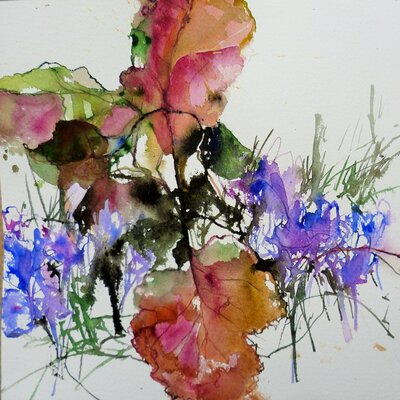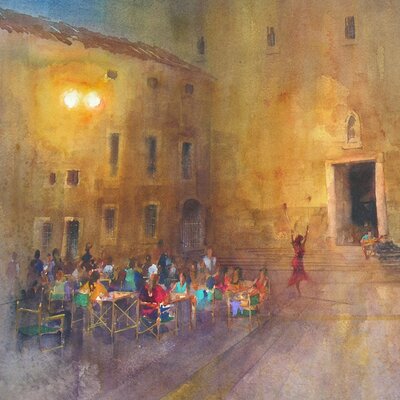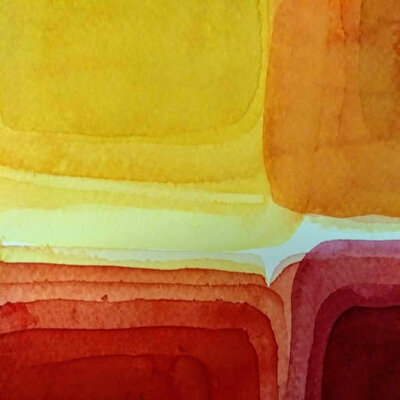Through your own painting practice in watercolour, develop your technical skills with the medium and extend your responses to your subject matter. Using exercises, your tutor will ask you to develop your technical approaches to your work. The exercises may invite you to work in a particular way, or with a specified approach or materials, or both. The exercises may involve drawing, painting, writing, or a combination of these. You will be working with your own choice of subject material.
By looking at examples of other artists work, you will be introduced to various contemporary painters and working methods. The aim is to show a range of possible strategies, which you might employ in your own work. This will also help to develop your understanding of watercolour as a contemporary medium and inspire your own thinking. Through group discussion and individual tutorials, you will be pushed to extend your thinking and conceptual approaches. You will be required to engage in individual reflection in relation to your practice. Group tutorials will be used as a way of introducing new ideas, to summarise progress in the context of collective feedback and thought, and to develop your understanding of your painting practice within the context of contemporary painting generally. The concept of reflective studio practice will help you begin to develop the notion of critical thinking in relation to your work.
The course is couched within the broader art-historical context of watercolour painting - you will be asked to consider your practice in relation to this history, changing notions of watercolour as a medium and the innovative use of watercolour as a contemporary painting medium.
By the end of this course, you will have increased knowledge and understanding of your approach to watercolour painting, your conceptual thinking around the medium and begun to be a reflective studio practitioner. You will have improved handling of your materials and started to understand your watercolour work within the broader context of contemporary art history.
Included
Watercolour paper
What students need to bring
The following list is provided as a suggestive guide, please feel free to bring along whatever equipment is suitable for your practice:
- Watercolour/water-based pigments of your choice - reds, blues, and yellows, possibly a black and a white, plus any other pigments that you like to use
- A range of brushes large and small and any other implements for applying pigments
- A reasonable supply of papers or supports
- A sketchpad
- Water container
- 3B pencil and putty rubber
- Water-soluble graphite pencil
- Gummed tape
- Palette
- Drawing/technical pen
- Writing pad/notebook and biro
You may also want to bring photographs, postcards, magazine/newspaper images, illustrations, etc., if you think these might be suitable subject matter for some of your work.
No specific required preparation or reading, but you may find it useful to have a look at any text about contemporary painting /contemporary art history (1960s onwards). Any other text which extends your thinking about your painting practice, the medium of watercolour and your understanding of what painting is may also be useful. Please feel free to bring these texts with you.
Additional information
Please wear appropriate clothing/aprons for the workshop or studio, this includes stout covered footwear (no sandals or open toes).
Student registration: 10.30am - 11am
Course teaching: 11am – 5.15pm
Morning session: 11am - 1pm
Lunch break: 1pm - 2pm (lunch is not included)
Afternoon session: 2pm - 5.15pm (15 minute break, 3.30pm–3.45pm)
Teaching finishes: 5.15pm
Short courses are open to anyone aged 18 and over. The course fee covers tuition and materials where stated. You will need to bring all other items listed under the Materials to bring section.
Refreshments
Coffee and tea are included in the course fee, but you will need to bring lunch with you to eat in the refreshments room. There are also plenty of other local venues to purchase food.
Access
If you have any specific access needs, we will need to know about your access requirements in advance. Please tell us about your needs in confidence by emailing: [email protected]
This venue has steps to the front reception, with limited access via a side gate to the ground floor. There is a small lift to higher floors or stairs.
Safety
Short course students are required to sign a safety compliance form as part of West Dean Health and Safety regulations.
Refunds and cancellations
Please refer to our terms & conditions below.
Disclaimer
The information given is accurate at the time of publication. However, West Dean College reserves the right to cancel or amend courses if circumstances require.





